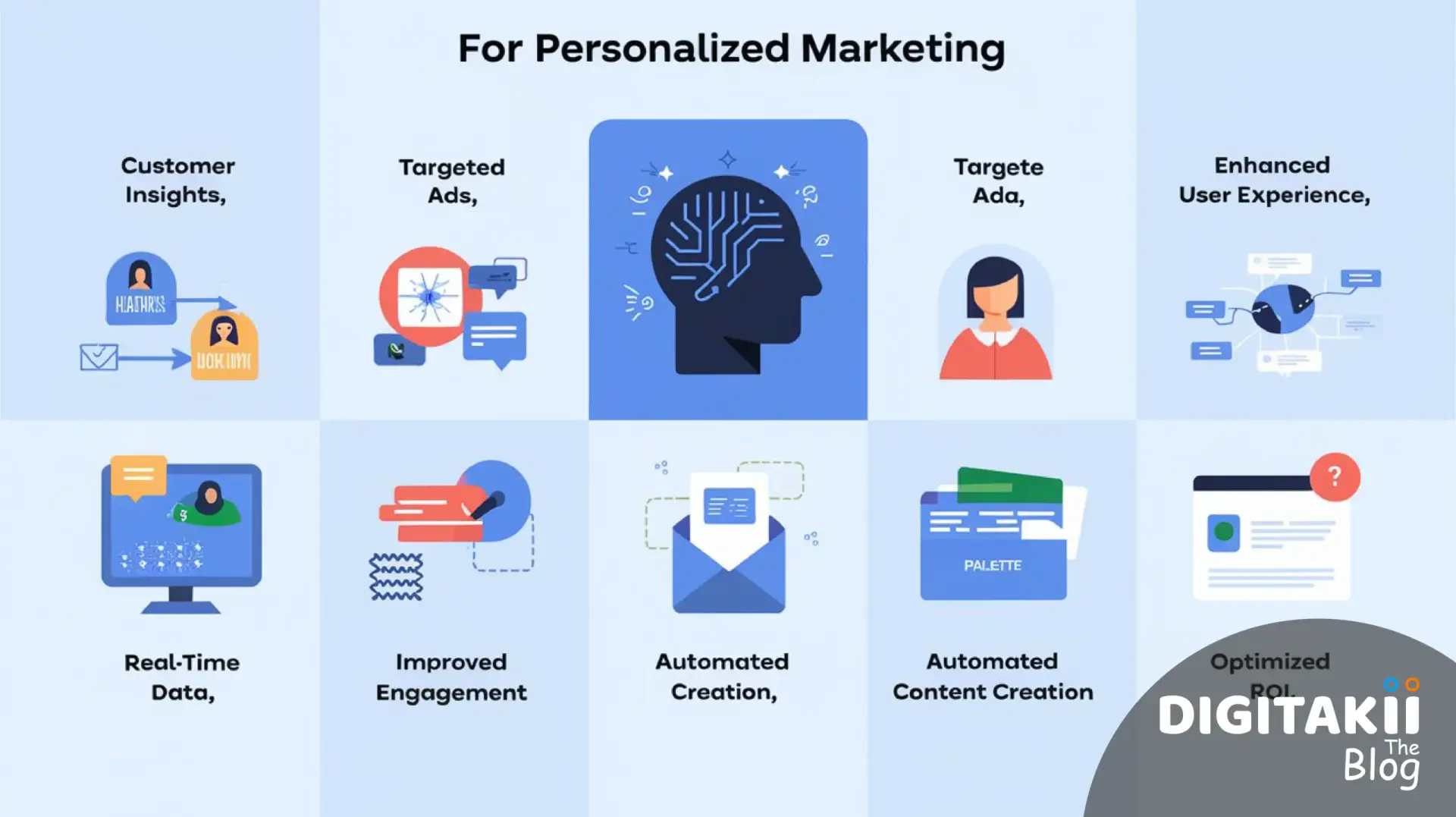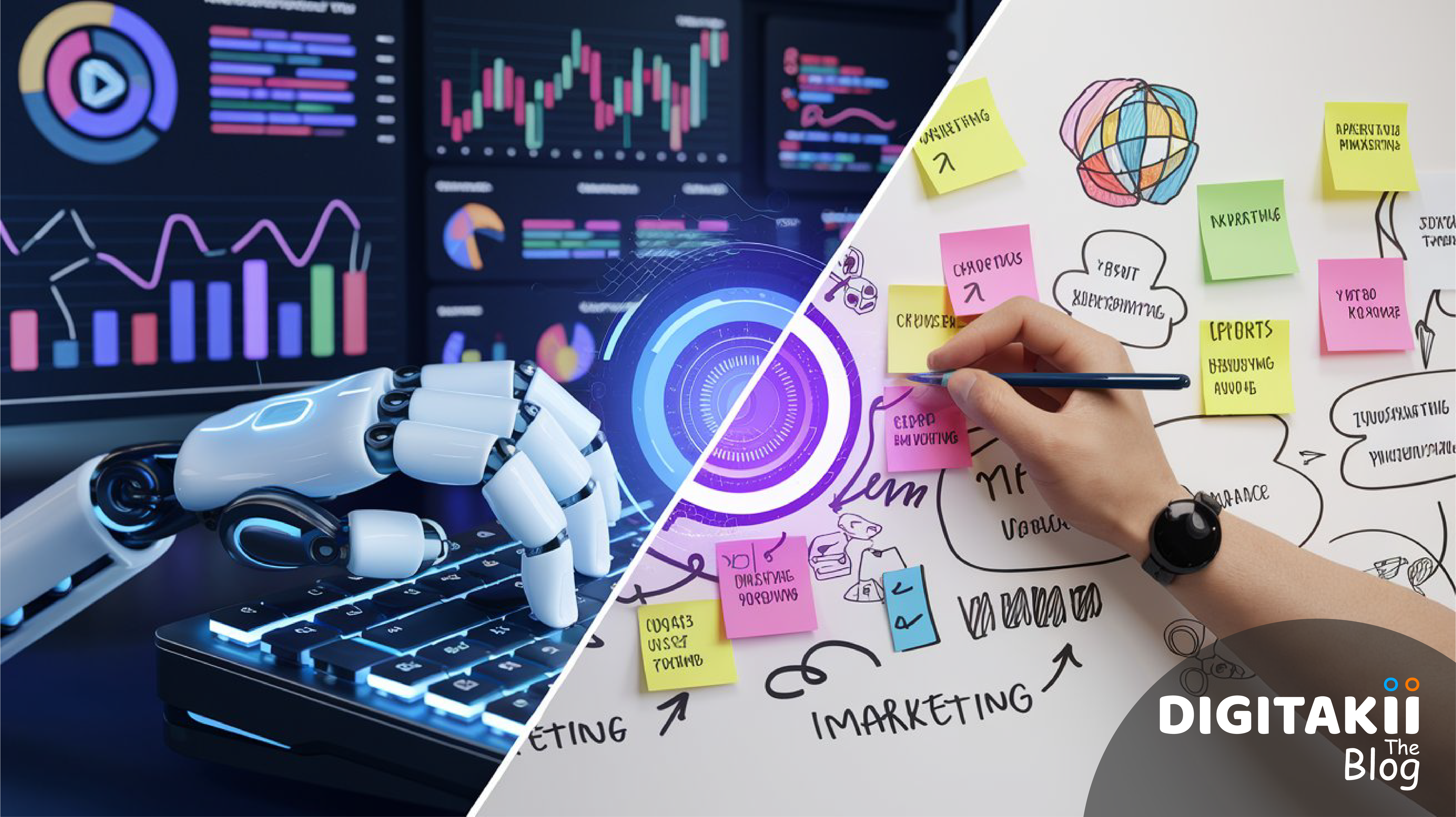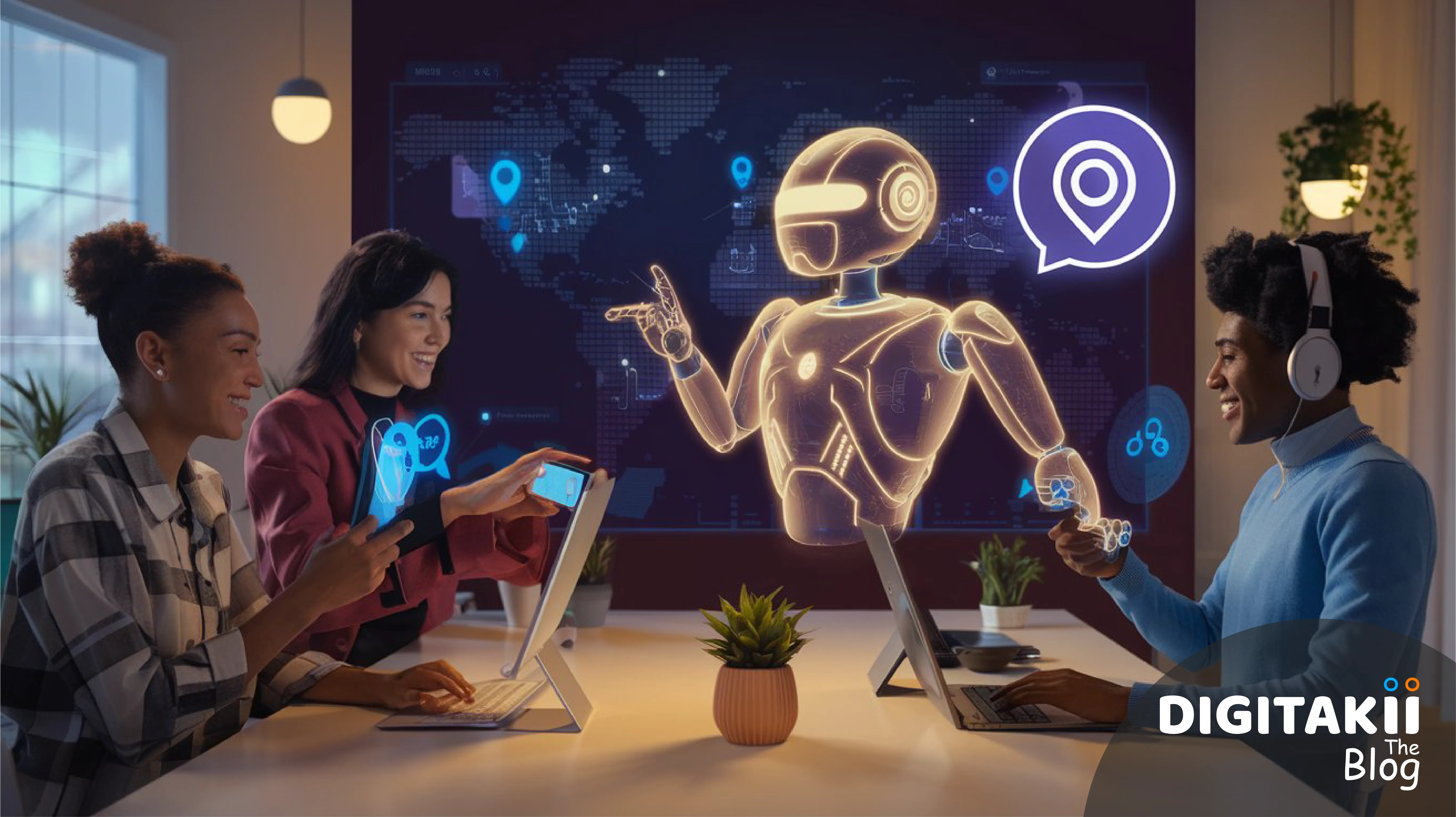In today’s digital world, personalization is key for marketing success. Consumers want experiences that feel made just for them. Businesses are using artificial intelligence (AI) to make their marketing more personal. This article will show you the 7 main benefits of using AI for personalized marketing.
AI helps businesses create targeted campaigns and offer personalized experiences in real-time. It uses customer data and predictive models to help marketers make better choices. This leads to better content, smoother interactions across different channels, and a unique edge over competitors.
Key Takeaways
- Discover the 7 key benefits of using AI for personalized marketing
- Learn how AI-powered insights can boost targeted campaigns and customer data analysis
- Explore the advantages of predictive modeling and dynamic content optimization
- Understand the impact of real-time personalization and omnichannel experiences
- Discover the power of AI-driven customer segmentation and recommendation engines
Introduction to AI-Driven Personalized Marketing
In today’s digital world, personalization is key for businesses to keep their customers. People want experiences that match their own likes and habits. AI-driven marketing changes how companies reach out and connect with their audience.
The Rise of Personalization in the Digital Age
Digital channels and lots of customer data have made personalization more important. Consumers want to feel understood, and businesses that don’t risk losing to others. AI helps companies understand and meet their customers’ needs with targeted strategies.
How AI Enhances Personalized Marketing Strategies
AI personalization goes beyond simple groups. It digs deep into data to find detailed insights. With customer data analysis, AI helps make targeted marketing campaigns that meet individual needs. This approach boosts campaign success and builds stronger ai personalization and loyalty.
| Key Benefits of AI-Driven Personalized Marketing | Description |
|---|---|
| Improved Customer Engagement | AI personalization makes content more relevant, boosting engagement and brand love. |
| Enhanced Conversion Rates | AI-guided strategies increase conversion rates by offering the right things to the right people. |
| Increased Customer Lifetime Value | AI helps understand customer preferences, leading to lasting, profitable relationships. |
| Optimized Marketing Spend | AI personalization helps use marketing resources better, cutting waste and improving ROI. |
The role of ai personalization in marketing will keep growing. By using AI, businesses can offer top-notch experiences and stay competitive.
7 Benefits of Using AI for Personalization in Marketing
In the fast-paced world of digital marketing, using AI for personalization is a major breakthrough. Marketers can now create experiences that really speak to their audience. Here are 7 key benefits of using AI for personalization in marketing:
- Targeted Marketing Campaigns: AI lets you send content, products, and offers that match each customer’s needs, boosting engagement.
- Predictive Modeling: AI digs through customer data to guess their behavior and preferences, helping you make better marketing choices.
- Dynamic Content Optimization: AI tweaks content on the fly to fit what each user likes, making experiences more personal.
- Seamless Omnichannel Experiences: AI ties together data from all channels, giving customers a consistent, personalized journey.
- Effective Customer Segmentation: AI helps you make more precise customer profiles, leading to more effective marketing.
- Personalized Recommendation Engines: AI suggests products based on what customers like, making it easier for them to find what they want.
- Competitive Advantage: Using AI for personalization keeps you ahead, offering a better customer experience than your competitors.
These are just a few of the many benefits of using AI for personalization in marketing. As digital marketing keeps changing, using AI for personalization is key for businesses wanting to stand out and give great experiences.
Targeted Marketing Campaigns with Precision
In today’s digital world, making targeted marketing campaigns is key for businesses. AI has changed how brands use customer data. Now, they can target their audience with great precision.
Leveraging Customer Data for Accurate Targeting
AI helps create targeted marketing campaigns by analyzing customer data deeply. This lets marketers understand what customers like and need. They can then send messages that really speak to their audience.
- AI helps marketers understand who their customers are, what they like, and what they buy.
- It predicts what customers might want next, so marketers can offer them exactly what they’re looking for.
- AI also makes sure marketing goes to the right people, at the right time, for the best results.
This leads to a marketing plan that works better. It brings in new customers and strengthens bonds with current ones.
“AI-driven personalization allows us to create marketing campaigns that truly resonate with our customers, leading to higher engagement, conversion rates, and customer loyalty.”
Using AI for customer data analysis helps businesses make marketing that feels personal. This approach leads to better results and happier customers.
Predictive Modeling for Smarter Decision-Making
In the world of AI marketing, predictive modeling is a key tool for smart choices. It uses past data and advanced algorithms to guess what customers will do next. This helps marketers plan better and make their campaigns more effective.
Predictive modeling is great at guessing what customers want. It looks at lots of data to find patterns that humans can’t see. This lets marketers send messages and offers that really speak to each customer, making their experience more personal.
| Advantage | Description |
|---|---|
| Improved Targeting | Predictive models can find the best customers to reach out to. This means marketing money is spent wisely. |
| Enhanced Campaign Performance | Knowing what customers will do helps marketers make their campaigns better. This leads to more people engaging and buying, which is good for business. |
| Reduced Risks | Predictive analytics can spot and avoid problems. This helps marketers make better choices and avoid big mistakes. |
As the digital world keeps changing, using predictive modeling will be more important for marketers. By using AI, they can really get to know their customers. This leads to smarter choices and helps businesses grow over time.
Dynamic Content Optimization in Real-Time
In today’s fast-paced digital world, adapting marketing quickly is key. Dynamic content optimization with AI helps businesses tailor their offers to each customer. This way, they meet the unique needs and preferences of every shopper.
Adapting to Customer Preferences and Behavior
AI makes real-time personalization possible. Marketers can now analyze customer data and adjust content instantly. This ensures their digital experiences stay relevant and engaging.
- Leverage predictive analytics to anticipate customer needs and preferences
- Dynamically optimize website content, email campaigns, and other digital touchpoints
- Deliver personalized product recommendations and offers based on individual behavior
- Enhance user engagement by providing tailored experiences that resonate with each customer
By using AI for dynamic content optimization and real-time personalization, companies can lead the market. They can meet customer needs and create experiences that build loyalty and grow their business.
Real-Time Personalization for Seamless Experiences
In today’s digital world, giving customers a seamless, personalized experience is key. Businesses need to stay ahead by using AI for real-time personalization. This changes how companies connect with their audience.
AI lets companies adjust their marketing and content on the fly. They can tailor it to each customer’s unique tastes and actions. This makes the customer’s journey smooth and personal, from start to finish.
- AI algorithms quickly analyze customer data. This lets companies change product suggestions, content, and user experience fast.
- Predictive analytics help businesses guess what customers need. They can then offer solutions that fit perfectly, building loyalty and engagement.
- AI-driven content optimization makes every interaction special. It ensures each customer gets a tailored, seamless experience.
Using real-time personalization helps companies build stronger bonds with their customers. By matching their preferences and actions in real-time, businesses create experiences that truly connect. This leads to happier customers, more engagement, and loyalty.
“Personalization is not just about tailoring the messaging or the product; it’s about creating a seamless, end-to-end experience that feels truly customized to the individual.” – Marketing Strategist, Jane Doe
The need for personalized experiences keeps growing. AI-driven real-time personalization will be more important for businesses to succeed online. By using this technology, companies can offer unmatched experiences. This builds loyalty, boosts sales, and makes them leaders in their field.
Omnichannel Experiences for Consistent Engagement
In today’s digital world, customers want seamless, personalized experiences everywhere. Artificial Intelligence (AI) is a key tool for making this happen. It helps businesses offer consistent omnichannel experiences that build stronger connections with customers.
Bridging the Gap Across Channels
AI makes it possible to understand customers better by combining data from different places. This includes websites, mobile apps, in-store visits, and customer service. With this data, AI can create a detailed picture of what customers like and need, helping businesses tailor their experiences.
For instance, if a customer looks at products online, they might get special offers in the store. This makes their shopping journey smooth and personal. Such customer segmentation and integration across channels boosts satisfaction and loyalty. It also leads to more sales and revenue.
| Channel | Key Personalization Capabilities |
|---|---|
| Website | Personalized product recommendations, dynamic content optimization, real-time engagement |
| Mobile App | Location-based offers, push notifications, in-app personalized experiences |
| In-Store | Personalized sales interactions, digital kiosks, integrated loyalty programs |
| Customer Service | Predictive customer support, personalized troubleshooting, seamless handoffs |
By linking these channels together, businesses can offer a unified and personalized omnichannel experiences. This approach strengthens customer connections, boosts loyalty, and fuels business growth.
Effective Customer Segmentation and Profiling
In today’s world, customer segmentation and profiling are key for businesses. They help deliver experiences that feel made just for you. Artificial Intelligence (AI) has changed how we do this, making it more precise than ever.
AI lets marketers break down their audience into very specific groups. They can look at things like who you are, what you like, and how you shop. This way, they can make ads that really speak to each group.
- AI-powered customer profiling gives a better look at what each person likes and needs.
- Predictive analytics spot trends and guess what customers might do next. This helps marketers plan ahead.
- Automated, real-time customer segmentation keeps marketing fresh and in tune with what customers want.
AI helps marketers make content, offers, and experiences that really connect with people. This leads to more engagement, loyalty, and sales. By using AI in their marketing, businesses can stay ahead in the fast-changing digital world.
“AI-powered customer segmentation is the key to unlocking hyper-personalized marketing that truly resonates with your audience.”
Personalized Recommendation Engines
In today’s digital world, customers face a sea of choices. Personalized recommendation engines, powered by AI, help them find what they need. These systems use customer data analysis to suggest products that match their tastes and habits.
Enhancing Product Discovery and Conversion
AI-driven recommendation engines look at what users have browsed and bought. They also consider demographic info. This way, they suggest products that are likely to interest the user. It helps customers find new things and boosts the chances of a sale.
- Personalized product recommendations based on past behavior and preferences
- Intelligent cross-selling and upselling suggestions to enhance the customer experience
- Dynamic content recommendations that adapt to user engagement and preferences
By using these AI-powered engines, businesses can build stronger relationships with their customers. This leads to more engagement and higher sales.
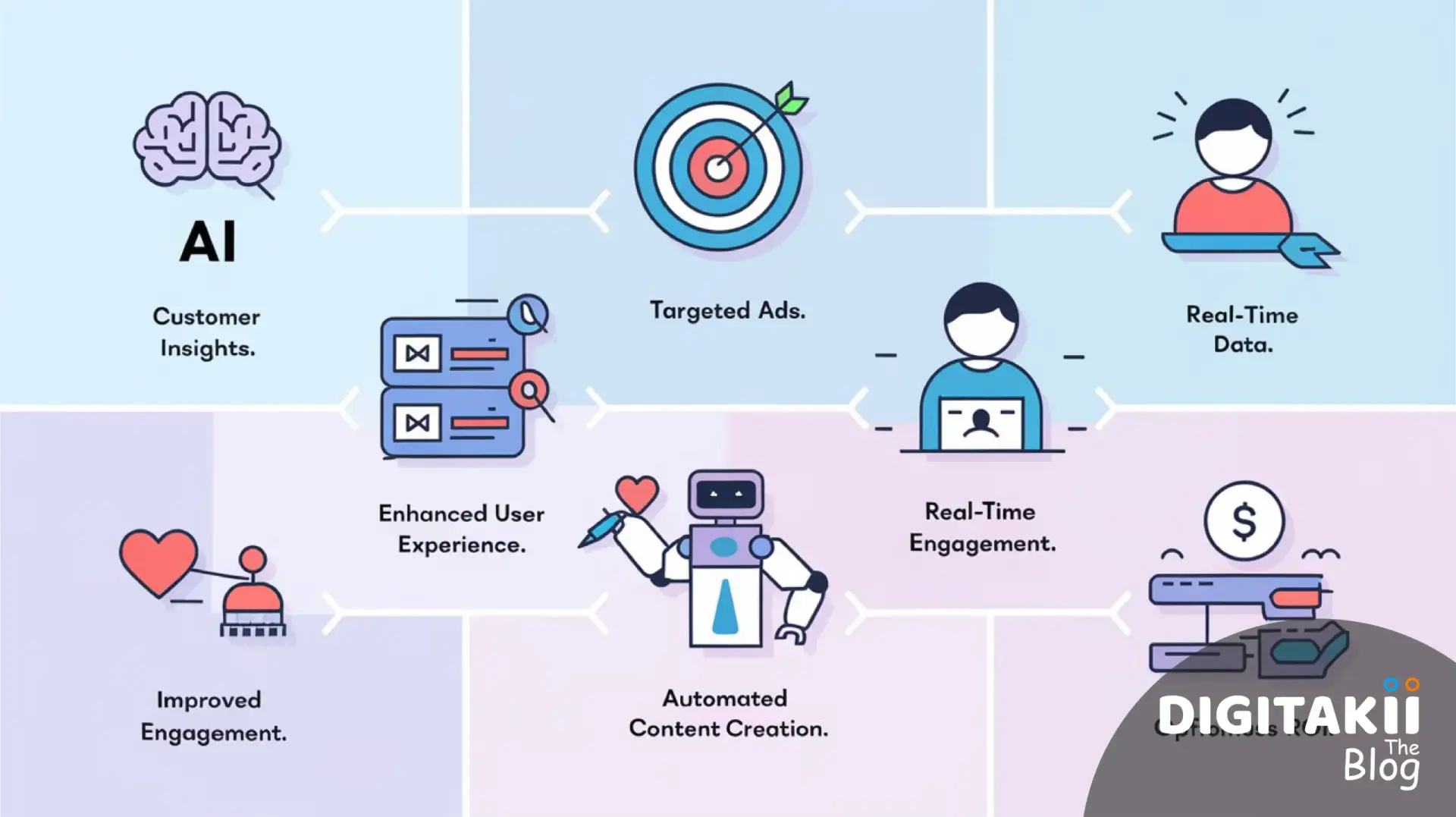
Personalized recommendation engines are a game-changer in the world of e-commerce, empowering businesses to deliver a tailored experience that resonates with each individual customer.”
The role of customer data analysis and AI in e-commerce will keep growing. By using personalized recommendation engines, companies can offer a better shopping experience. This keeps them competitive in the digital market.
AI-Powered Personalization for Competitive Advantage
In today’s crowded marketplace, brands must find new ways to stand out. Using ai personalization can give them a unique edge. It helps businesses create targeted marketing campaigns that speak directly to their audience.
AI personalization lets businesses collect and analyze lots of customer data. This deep dive into customer preferences helps brands create messages that really hit home. By offering content that matches what customers want, businesses can build stronger connections, boost engagement, and see more sales.
| Metric | Improvement with AI Personalization |
|---|---|
| Click-through rate | Up to 20% increase |
| Conversion rate | Up to 15% increase |
| Customer lifetime value | Up to 25% increase |
AI personalization also lets businesses adapt quickly to what customers need. This makes for a smooth and relevant experience everywhere. Being able to respond fast and accurately can make a brand stand out, building trust and loyalty.
By tapping into the power of ai personalization, companies can gain a competitive edge. This leads to happier customers, more sales, and loyal fans. As the digital world keeps changing, being able to personalize on a big scale will be key for those who want to lead.
Ethical Considerations in AI-Driven Personalization
The use of AI personalization is growing fast. It’s key to think about the ethics of this tech. AI personalization helps marketers and customers a lot. But, it also makes us worry about privacy, data safety, and how to use customer data right.
Balancing Personalization and Privacy
AI personalization needs customer data to work. But, how do we balance personal experiences with keeping privacy? People want their privacy respected. Companies must be open about how they use data.
- Implement robust data privacy policies that protect customer information.
- Provide clear and straightforward options for customers to control the use of their data.
- Ensure that customer segmentation and data analysis practices do not infringe on individual privacy.
“Personalization should never come at the expense of customer trust. Organizations must prioritize privacy and data ethics in their AI personalization strategies.”
| Benefit | Potential Privacy Concern |
|---|---|
| Personalized product recommendations | Overly intrusive tracking of customer behavior |
| Tailored marketing messages | Unauthorized use or sharing of customer data |
| Predictive insights for business decisions | Discrimination based on customer profiles |
By tackling these ethical issues, companies can use AI personalization well. They can keep their customers’ trust and confidence.
Measuring the Impact of AI-Driven Personalization
Businesses are using AI more for personalized marketing. It’s key to see how well these efforts work. By looking at important metrics, companies can understand their AI strategies better. This helps them make smarter marketing choices.
Customer engagement is a big way to check AI’s impact. Look at website visits, clicks, sales, and how often customers come back. By comparing these before and after AI, businesses can see how much better things are.
| Metric | Description | Benefit of AI Personalization |
|---|---|---|
| Website Visits | The number of visitors to a website | AI-driven personalization can increase website traffic by providing more relevant and engaging content to customers. |
| Click-through Rate (CTR) | The ratio of users who click on a specific link to the total number of users who view a page | Personalized content and product recommendations can significantly improve CTR, as customers are more likely to engage with content that aligns with their preferences. |
| Conversion Rate | The percentage of visitors who complete a desired action, such as making a purchase | AI personalization can enhance the customer experience and increase the likelihood of conversions by suggesting products or services that are more relevant to their needs. |
| Customer Retention | The ability to keep customers engaged and loyal over time | Personalized experiences and recommendations can foster stronger customer relationships, leading to improved retention and loyalty. |
Looking at customer data is also important. By studying what customers like and do, companies can see if their personalization works. This helps them make their marketing even better.
Getting AI personalization right means tracking its effects. By watching key numbers and customer data, businesses can improve their marketing. This keeps them competitive in the fast-changing world of personalized marketing.
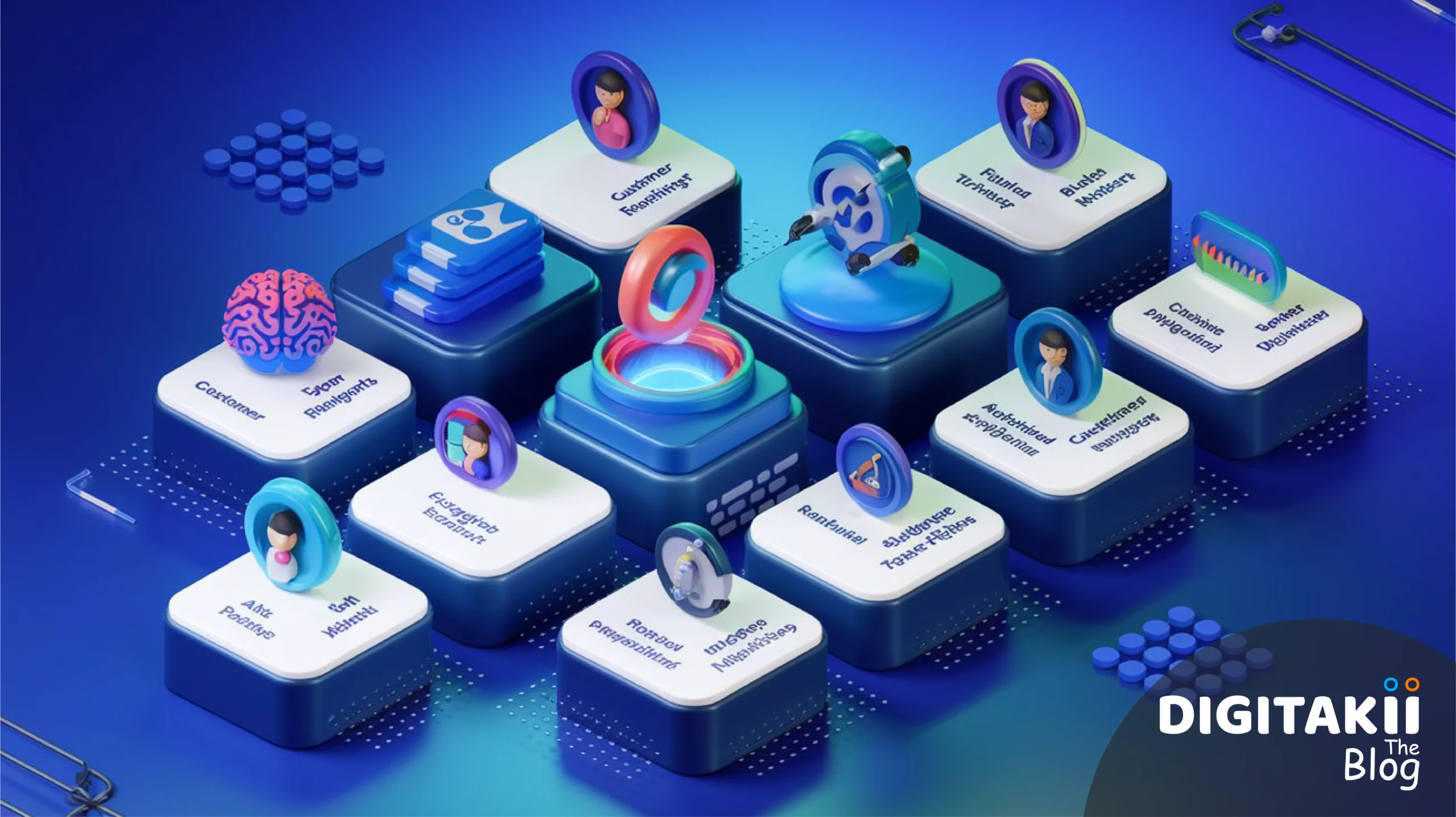
Challenges and Limitations of AI Personalization
The use of ai personalization is growing fast. It’s key to tackle the challenges and limits of this tech. The benefits of AI-driven personalization are many, but there are obstacles to overcome for success.
Overcoming Obstacles to Successful Implementation
Managing and analyzing customer data is a big challenge in ai personalization. Getting, mixing, and keeping good data from different places is hard and takes a lot of time. Companies need strong data management plans and must keep data safe and private to start personalizing well.
- Effective data collection and integration
- Ensuring data quality and accuracy
- Protecting customer data and privacy
Another big challenge is the technical side of setting up AI personalization systems. Putting AI models and machine learning into marketing systems is complex. Companies need skilled teams, the right tools, and ongoing care to get past these tech issues.
| Challenge | Potential Solutions |
|---|---|
| Data management and integration | Develop robust data strategies, invest in data management tools, ensure data quality and security |
| Technical complexity of AI implementation | Build dedicated AI/ML teams, leverage specialized personalization platforms, continuous improvement |
| Balancing personalization and privacy | Transparent data policies, customer consent management, ethical AI practices |
| Measuring the impact of personalization | Establish clear KPIs, utilize advanced analytics, continuous testing and optimization |
Also, finding the right balance between ai personalization and customer privacy is tough. Being open about data use, getting customer okay, and following privacy laws are key to trust and a good brand image.
Lastly, showing how ai personalization works can be hard. Setting clear goals, using advanced stats, and always testing and improving personalization plans are vital to prove its worth.
By tackling these challenges, companies can fully use ai personalization. This leads to better, personalized experiences. These experiences boost customer loyalty and help businesses grow.
Future Trends and Advancements in AI Personalization
The digital world is always changing, and AI personalization is no exception. Soon, real-time personalization will be everywhere. Businesses will offer custom experiences to customers right when they need them.
Natural language processing (NLP) and computer vision will get better too. This means we’ll understand and meet customer needs better. We’ll see more seamless experiences across all channels.
Technologies like 5G and edge computing will make real-time personalization even faster. They’ll let businesses process data quickly and deliver personalized content fast. The Internet of Things (IoT) will also play a big role. It will give us deeper insights into what customers like, making recommendations even more personal.
In the future, AI might get even smarter. It could predict what customers want and offer them exactly what they need. This will make customers happier and more loyal to the businesses that use AI well.
FAQ
What are the key benefits of using AI for personalization in marketing?
Using AI for personalization in marketing offers many benefits. It helps create targeted campaigns and makes smarter decisions with predictive modeling. It also optimizes content in real-time and personalizes experiences instantly.
AI ensures consistent engagement across all channels. It helps segment customers effectively and provides personalized recommendations.
How can AI enhance personalized marketing strategies?
AI boosts personalized marketing by analyzing data deeply and predicting customer behavior. It optimizes content and experiences in real-time. This makes campaigns more targeted and effective.
AI helps deliver consistent experiences across different channels. It adapts to customer preferences, making marketing more personal and engaging.
What are the ethical considerations in using AI for personalization?
Using AI for personalization raises important ethical questions. It’s vital to balance personalization with customer privacy and data protection. Businesses must be open about how they collect and use data.
They should respect customer preferences and consent. This ensures personalization is done ethically and with transparency.
How can businesses measure the impact of their AI-driven personalization efforts?
Businesses can track key metrics to measure AI’s impact. They should look at customer engagement, conversion rates, revenue, and ROI. Analyzing customer feedback and satisfaction also helps assess personalization’s effectiveness.
What are some of the challenges and limitations of AI personalization?
AI personalization faces several challenges. It requires high-quality data and can be complex to integrate with existing systems. There’s also a risk of bias in algorithms.
Human oversight is crucial to ensure personalization is effective and ethical. This ongoing effort is necessary for success.
What are the future trends and advancements in AI personalization?
The future of AI personalization looks promising. We can expect more real-time personalization and integration with new technologies like augmented reality and voice assistants. Privacy-preserving techniques will also advance, focusing on protecting customer data.
#7BenefitsOfUsingAIForPersonalizationInMarketing #AIPersonalization #TargetedMarketingCampaigns #CustomerDataAnalysis #PredictiveModeling #DynamicContentOptimization #Real-timePersonalization #OmnichannelExperiences #CustomerSegmentation #RecommendationEngines
===============================
Ready to dominate the digital world? 🚀💻
Don’t just exist online – THRIVE! At www.digitakii.com, we’re your secret weapon for digital success.
🌐 Stunning websites that convert 📱 Social media that sizzles 🔍 SEO that skyrockets your visibility 📊 Data-driven strategies for real results
Why blend in when you can stand out? Let’s craft your digital masterpiece together!
👉 Visit www.digitakii.com now and let’s make some digital magic! ✨
#DigitalMarketing #DigitalPresence #DigitalMarketingAgency
===============================
